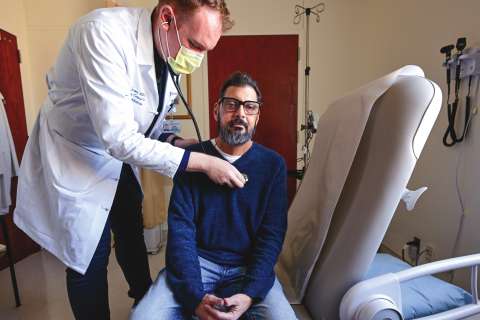We have experienced in our own families how racial and ethnic inequities in clinical trials — studies involving patients that evaluate the effectiveness and safety of medicines, devices or lifestyles to prevent or treat disease — can lead to tragic impacts on outcomes for patients of color.
When researchers, for example, are trying to determine if a new medication is effective, data points like blood pressure can act as strong informational signposts. But when it comes to how race and ethnicity impact results, the data may not be as obvious, and we should be more cautious when drawing conclusions from studies looking at small groups. Just because a medication shows promise for one racial or ethnic group doesn’t guarantee the same outcome for everyone. Not because of their race, per se, but because of the higher rate of comorbidity and underlying pre-clinical disease due to limited resources and opportunities for many minority groups.
At UCLA, we are working to address such inequities through the UCLA Clinical and Translational Science Institute’s Community Engagement and Research Program, of which we are co-directors. The program supports researchers in designing more inclusive clinical trials through large investments that are critical to success, such as helping study participants overcome transportation issues and bringing internet access to a rural community. Experts can also help with regulatory and other process-related challenges.
There are also service-level activities, such as a consultation service through the Community Engagement Research Program to help investigators build trust and minimize potential roadblocks to participation in clinical trials. Such community education and proactive partnerships are critical to improving representation in medical research for developing therapies that are effective for everyone.
Additionally, in partnership with the American Heart Association (AHA), we are engaged with colleagues from the University of Hawaii at Manoa and Washington State University to use smart phone messaging strategies such as texts and videos to encourage Native Hawaiians, Native Americans and other underrepresented groups to participate in studies about heart health.
It can be a steep, uphill climb. Cultural, social and socioeconomic factors continue to influence the lack of diversity in clinical trials. To recruit participants from underrepresented populations, you have to consider the reasons behind their lack of participation. Some of these reasons fall under the social determinants of health, such as lack of transportation and childcare. Other barriers are distrust of researchers, lack of knowledge about research processes and fear of potential negative effects or risk.
We must find better ways to overcome these barriers using tactics such as establishing diverse research teams and dedicating increased resources to directly address patient barriers. For example, our project in partnership with the AHA explores culturally tailored approaches such as hula dancing activities in Native Hawaii communities, culturally tailored nutrition for heart and metabolism-related issues for African American and Hispanic communities in Los Angeles and research as “ceremony,” embedding it within the culture, to examine sleep apnea in Native American communities. These culturally tailored approaches aim to increase representation by considering additional factors such as age, gender and specific health conditions.
Other UCLA researchers also are exploring ways to diversify studies. In July 2024, an interdisciplinary team began a study of how tests used to determine eligibility for new drugs like lecanemab to treat Alzheimer’s disease may vary in different racial and ethnic groups. They then plan to develop educational tools for patients and providers that highlight the differences, with the goal of tailoring care for each group.
In another study, a UCLA Health neurologist is developing a questionnaire that will include questions about factors that are known to influence the likelihood that a Black individual will sign up for a clinical trial. The assessment will ultimately help researchers focused on Parkinson’s disease evaluate and improve their recruitment of Black participants in clinical trials.
It can be a steep, uphill climb. Cultural, social and socioeconomic factors continue to influence the lack of diversity in clinical trials.To recruit participants from underrepresented populations, you have to consider the reasons behind why they may not be participating.
It is important for teams going into a community to provide the background and lay the foundation with patient advocates, leaders and organizations about what clinical trials are, why they are important, when there is benefit (or not) to a patient, why we need to do a given trial and why UCLA is a trustworthy partner in doing clinical trials. Their support can help address obstacles tied to recruiting and retaining volunteers for clinical trials.
The long-term goal is for the right treatment to be delivered to the right person at the right time, for all populations.
While health care professionals and institutions have made a start in diversifying clinical research, progress has been slow largely because of systemic issues and lack of investment. Nonetheless, we are seeing positive change resulting from increased awareness and policy shifts around diversity in research. Just the fact that there’s a conversation is progress.
A key point of moving toward inclusivity revolves around involving community leaders and organizations in research projects. This is a recommendation of the National Academies of Sciences, Engineering and Medicine, which recently had a team of researchers take a close look at this issue.
For example, during recruitment for a clinical trial, a person may be faced with an on-the-spot decision about their participation. Ideally, they will have the necessary information based on what they heard from trusted community leaders or learned themselves to give them peace of mind regarding past negative health care experiences or historical concerns.
There is a moral and scientific urgency to increase diversity in clinical trials, build trust with communities and promote fairness. But it is our job to prove to our communities we are trustworthy. We must continue to address each trial and community barrier to optimize a representative group of participants. At the end of the day, all communities benefit from advancements in quality medical research.
Dr. Keith C. Norris is Distinguished Professor of Medicine at the David Geffen School of Medicine at UCLA. Dr. Arleen F. Brown is professor of medicine and a health services researcher.
For more information about the UCLA Clinical and Translational Science Institute, go here.





